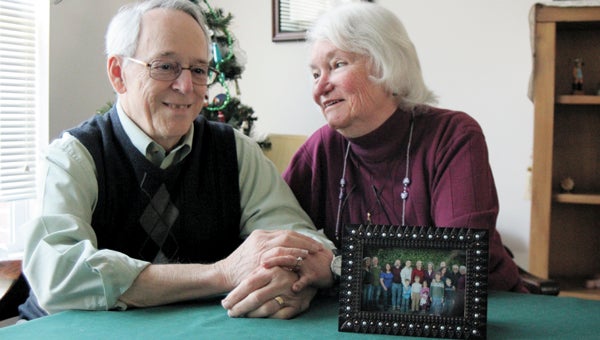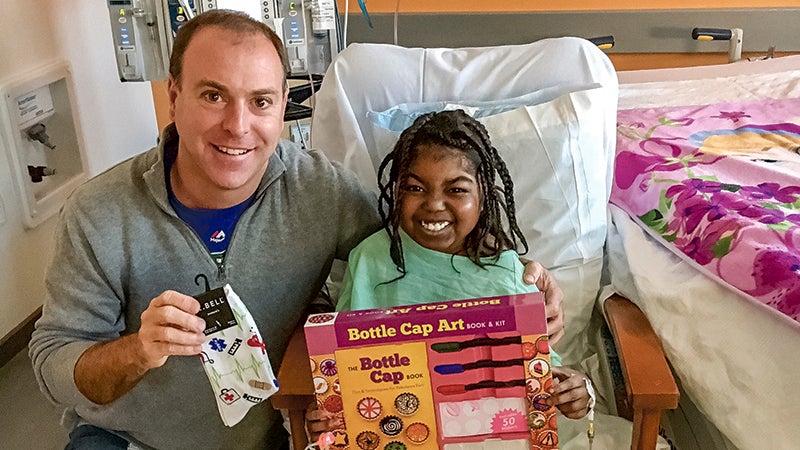Living with Alzheimer’s
Published 9:00 pm Monday, March 25, 2013

Unless a miracle cure is discovered, Ray and Margaret “Peggy” Cicirelli, pictured last week in their home at Suffolk’s Lake Prince Woods, will live the rest of their lives together with Ray Cicirelli’s Alzheimer’s disease. “It think Ray’s doing really well, and this particular community is very supportive,” Margaret Cicirelli said.
Margaret “Peggy” and Ray Cicirelli have a game they like to play with new visitors to their Lake Prince Woods home.
From a photo taken during a recent family reunion, they ask folks to identify which adult children belong to whom.
Ray Cicirelli, a 70-year-old Coast Guard veteran, brought to their marriage three children from his previous marriage, and 69-year-old Margaret, who served stints in both the Coast Guard and the Navy, contributed two from hers.
Despite Margaret Cicirelli and two of the children they have raised together not sharing her husband’s Mediterranean heritage, it’s not an easy task. Five grandchildren also crowd inside the photo frame, and they are one big happy extended family.
Margaret Cicirelli said she first suspected that something wasn’t right with her husband about three years ago.
“I noticed he was not his patient, quiet self,” she said. “He would get angry and yell, and that is not my husband.”
The first neurologist they saw wasn’t much help, she said. Then, on vacation about a year later, Ray Cicirelli passed out three times within an hour.
“He didn’t remember anything,” Margaret Cicirelli said. “I had to show him a huge mirror he’d fallen against and broken.”
Doctors at the emergency room suggested another neurologist, and then Ray and Margaret Cicirelli were on the path to finally learning what they’d be spending the rest of their lives together with, bar a miracle cure: Ray’s Alzheimer’s disease.
Though Alzheimer’s, the most common form of dementia, was identified more than a century ago, exactly how it changes the brain remains a mystery.
For Ray Cicirelli, currently in the early to intermediate stage of the disease — and still able to drive to buy groceries — the most common symptom, memory loss, was masked.
“I had never had a really good memory,” Ray Cicirelli said, “so it didn’t seem really strange” when he started forgetting things on account of the disease.
“It’s very unnerving. I do things I normally do, and then one day I can’t remember. (But) then some other day I might.”
One in nine people in Cicirelli’s age group has Alzheimer’s, a statistic set to worsen as the population ages, the American Alzheimer’s Association reports.
Virginia is among nine states where prevalence of the disease is projected to increase by between 49.1 percent and 81 percent above 2000 levels by 2025, a new association report says.
The number of Virginians with Alzheimer’s will grow from 100,000 in 2000 to 160,000 in 2025, according to the association.
“One in three seniors dies with Alzheimer’s disease or another dementia, which really speaks to how prevalent this disease is,” said Beth Kallmyer, the association’s vice president of constituent services.
Combined payments for health care, long-term care and hospice for Alzheimer’s and dementia sufferers will increase from $203 billion in 2013 to $1.2 trillion (2013 dollars) in 2050, the association estimates. Medicare and Medicaid cover about 70 percent of the cost.
Margaret Cicirelli, who attends a support group for those in her position “every once in a while,” and also more regularly attends a different support group with her husband, is among Virginia’s 443,000 Alzheimer’s and dementia caregivers. Every year, the association reports, these caregivers provide 504,000 hours of unpaid care.
The Cicirellis are living life to the fullest while they can. Travel is their passion: they’ve been to Russia, Tibet, China, Norway, England and Ireland. “Ray’s been to every state in the union,” Margaret Cicirelli said.
They’re taking a cruise to Mexico at the end of April, and this week they’re traveling to Georgia for grandchildren-babysitting duties.
Margaret Cicirelli said that Ray’s “doing really well,” adding that the retirement community they call home is particularly supportive.
“We still play poker Friday nights,” she said. “One reason we moved here, we don’t want to be a burden on any of our children.”





